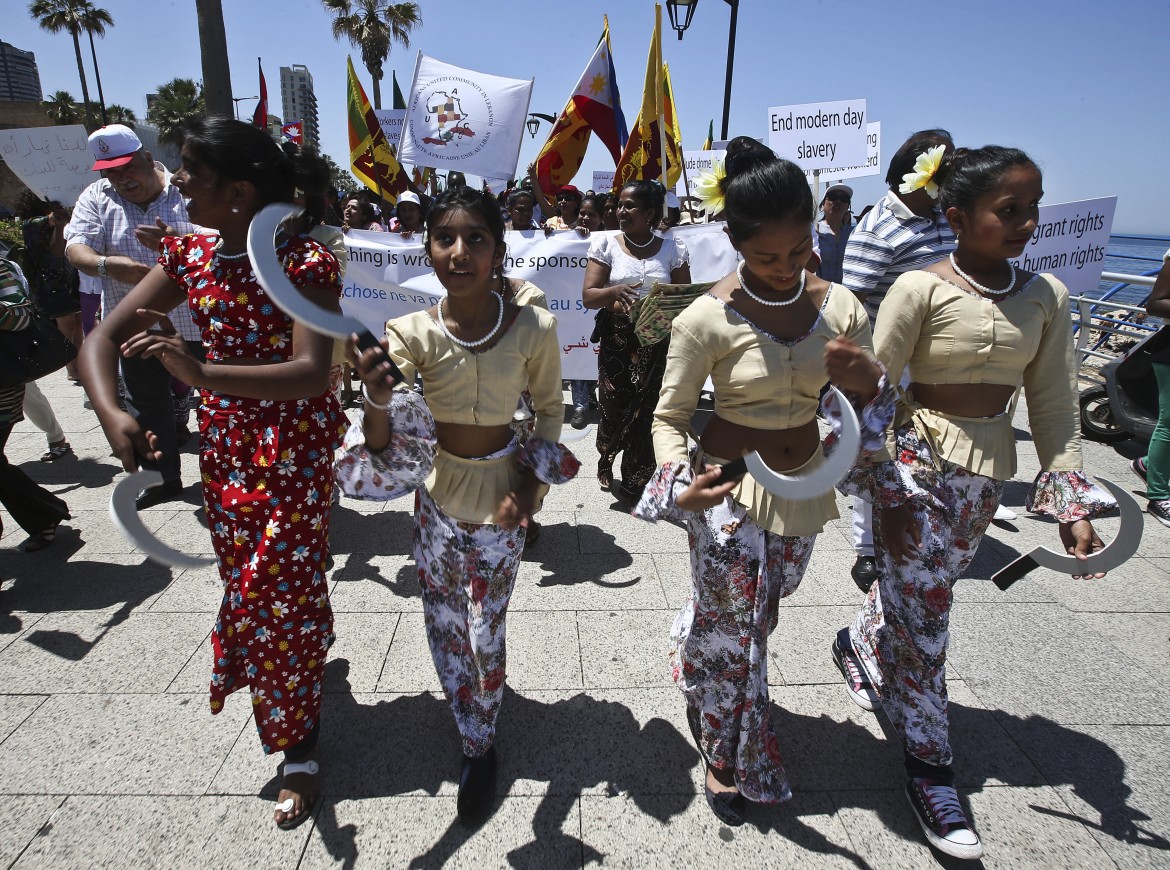Reportage
For ‘invisible women,’ coronavirus lockdown means lost wages or prison-like conditions
They don’t get any day off, sometimes they don’t get paid, and those who were already living in a situation of abuse are now stuck in the household with their abusers.

Food, drinking water, medicine, phone top-ups—these are the most frequent requests coming from the migrants who work as maids and caregivers in Lebanese homes, or as service workers in restaurants, hotels and shops. This is an army of workers, mostly women from Africa and Asia: over 250,000 people, plus about 75,000 irregular migrants.
For them, the quarantine to contain the spread of COVID-19, which began a month ago, means a further worsening of their living conditions, which had already deteriorated due to the economic-financial crisis that led Lebanon to default on its debt in March.
The exchange rate of the Lebanese lira against the dollar (a currency which is now impossible to obtain) rose to 2,600 lira per dollar on the parallel market, with a peak at 3,000 a few days ago, which then subsided. The salary of a domestic worker varies from 150 to 400 dollars on average, paid in Lebanese lira at the official exchange rate of 1,500 lira per dollar.
“I haven’t worked for two months,” says Mariam, a Filipino domestic worker who has been in Lebanon for 26 years and is an activist for the rights of domestic workers. “The family I work for is in Europe, and I don’t know when they’ll be back. Now, we are distributing basic necessities to those who need them. Many, especially those who used to work in restaurants and hotels, had already lost their jobs because of the crisis, and now they are stuck in often overcrowded houses, risking eviction if they cannot pay the rent. We are raising funds online and distributing aid to about a hundred houses.” Migrant communities have organized themselves to support those among them who are the most vulnerable, also with the support of the national embassies.
The Engna Legna Besides group, founded by Ethiopian women, is distributing basic necessities, while Lebanese and international organizations and NGOs are trying to ensure access to medical care and to verify that the working conditions in Lebanese homes are being respected, as well as to put pressure on the government to pay more attention to this large community, where the risk of an outbreak of contagion, like any prospect of an uncontrolled outbreak, poses a threat to public health.
The mechanism by which these workers are recruited, the sponsorship system called kafala, is precisely what is making them invisible. The migrant can only work for their sponsor, he or she cannot terminate the contract, and in case of abuse, the only way out is to escape, which means being left with illegal status in the country and risking arrest. Moreover, with the COVID-19 emergency, the organizations that offer shelter to those who are escaping abusive employers are closed. The illegal immigrants are in the very worst condition, explains Zeina Mohanna, head of the Protection of Migrants and Counter Trafficking project of the Lebanese NGO Amel: “They used to work as freelancers in the houses, and with the lockdown, many have lost their jobs because they are afraid of the controls in the streets.”
“For the same reason, they are reluctant to inform the authorities if they have symptoms attributable to COVID-19,” Mohanna adds. “Even if they want to request a test, they can’t do it without documents, and repatriations for the many who want to leave Lebanon have now stopped because of the quarantine. Furthermore, when the airport reopens, there will be the problem of the willingness and ability of their countries of origin to ensure quarantine and a safe return. That is why we have asked the security forces not to be inflexible at this time of health emergency, and it looks like they are being permissive, also to avoid overcrowding the prisons—but we cannot be sure to what extent this policy line is being applied.”
But even those who are living with their employers are not doing well. Quarantine means they have to work harder, because the whole family is at home, the children aren’t going to school and the demands are increasing. They don’t get any day off, sometimes they don’t get paid, and those who were already living in a situation of abuse are now stuck in the household with their abusers.
“We know about employers who aren’t providing masks and gloves to women workers, underestimating their exposure to the risk of contagion by sending them out shopping without protection,” says Rana el Serbaji. “And there are cases where they have been forbidden to report the onset of coronavirus symptoms. At the moment, we are not aware of any cases of contagion among domestic workers, but the data is generally not accurate, and we cannot definitively exclude the possibility that there might be people infected with the virus in the migrant community. Furthermore, not everyone can afford to get a test that costs 250,000 Lebanese lira (about $150).”
Over the years, domestic workers in Lebanon have organized themselves and raised their voices to demand the abolition of the kafala system. “Now we are dealing with this emergency, but we will go back to fighting for our rights,” says Mariam, and she recalls the tragic story of Faustina Tay, perhaps the latest victim of the violence that domestic workers are suffering in some Lebanese homes.
The 23-year-old Ghanaian woman was found dead in Beirut on March 14, in the parking lot next to the house where she worked. She had been sending requests for help for days, saying she was in fear for her life. Her death, initially ruled a suicide, is now being investigated.
Originally published at https://ilmanifesto.it/le-donne-invisibili-fanno-rete/ on 2020-04-18
